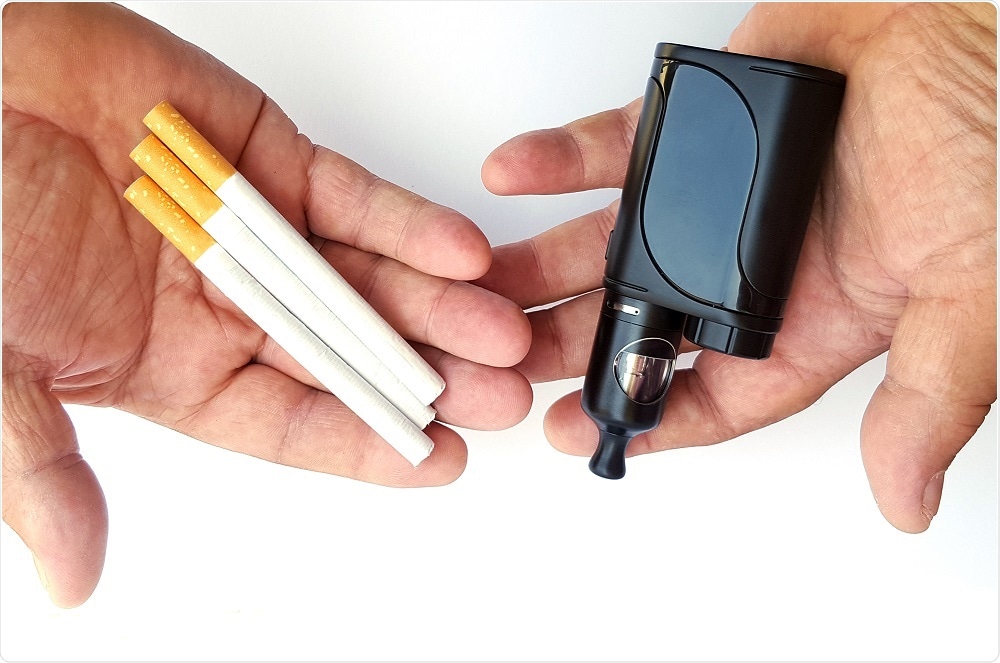Yes. Growing consensus suggests that e-cigarettes confer no more than 5% of the health risks associated with smoking. This is primarily due to the fact that e-cigarettes do not involve combustion which leads to the formation of harmful toxic and cancer-causing compounds.
 ducu59us | Shutterstock
ducu59us | Shutterstock
Tobacco contains more than 600 compounds which are turned into around 5,000, including at least 70 carcinogens, when a cigarette is lit and tobacco burnt at around 800 degrees centigrade. By comparison, e-liquids used in e-cigarettes are primarily composed of humectants, such as propylene glycol and vegetable glycerin, nicotine and flavorings which are heated to around 200 degrees centigrade.
Studies have shown that, compared with cigarette smokers, users of e-cigarettes are exposed to much lower levels of harmful compounds that have been linked to subsequent disease such as cancer. In addition, cigarettes produce side-stream smoke which escapes, in addition to the exhaled smoke, and which is very harmful to bystanders. There is no side-stream vapor, only the exhaled vapor from users, which contains a fraction of the compounds inhaled by the vaper.
Can e-cigarettes be harmful to human health? How much do we know about the long-term use of e-cigarettes?
Most things, even relatively innocuous substances, can be harmful to humans, and e-cigarettes are no exception. As diseases often occur with a long-time lag (20-40 years) after exposure, we cannot be sure that e-cigarettes are completely safe because we simply do not have the data yet.
Moreover, there may be ‘unknown unknowns’ which differ from the harms caused by cigarettes that have yet to be identified and evaluated. However, within the context of continued smoking, e-cigarettes present a much less harmful alternative, simply because cigarettes are such a dangerous product, and e-cigarettes are tightly regulated for quality and safety. While it is difficult at this stage to estimate the impact of long-term use of e-cigarettes precisely, we have some knowledge about some of the constituents that are used in e-liquids.
Nicotine replacement has been widely used for many years to help people to stop smoking and is a safe form of treatment. Nicotine, while addictive, is a relatively harmless substance with little evidence for long-term adverse health effects based on studies that have looked at the use of nicotine replacement therapy and snus (Swedish smokeless tobacco). The humectants used in e-cigarettes are commonly found in food stuffs (e.g. tooth paste), as are most of the flavorings, and these are generally considered to be safe. What we do not know is how inhaling these substances into the lungs long-term
The humectants used in e-cigarettes are commonly found in food stuffs (e.g. toothpaste), as are most of the flavorings, and these are generally considered to be safe. What we do not know is how inhaling these substances into the lungs long-term will affect them, and it would seem reasonable that at the very least this would cause some irritation and inflammation.
But to reiterate, cigarettes are much more harmful because of the large number of combustion products inhaled into the lungs, and research that others and I have conducted shows that exposure to carcinogens linked to diseases such as lung cancer are greatly reduced in vapers compared with smokers, suggesting health benefits in the long-term for those switching to e-cigarettes from cigarettes. The main harm from smoking comes from the thousands of other chemicals contained in tobacco smoke, many of which are toxic.
 Piotr Swat | Shutterstock
Piotr Swat | Shutterstock
Please describe the video you produced for the PHE quit smoking campaign. What effect does the inhalation of tar from cigarette smoke have on the human body?
Public Health England’s Smokefree ‘Health Harms’ campaign encourages smokers to stop smoking in the New Year by making them aware of the immediate, personal and irrefutable harm to health from every single cigarette smoked. December is a natural point in time for smokers to reappraise their behaviour and when motivation to make changes to long-standing bad habits naturally start to peak ahead of the New Year.
E-cigarettes are the most popular aid to quit smoking in the UK and growing evidence shows they are effective in helping people quit, but many smokers (44%) still don’t realize they are much less harmful than vaping. That’s why as part of the campaign this year, PHE released a short film to illustrate visually current research comparing the effects of vaping and smoking.
The film features a simple demonstration illustrating the high levels of tar inhaled by an average smoker over a month and how this compares to not smoking or using an e-cigarette. Its purpose is to illustrate the stark contrast between smoking and vaping to reassure smokers that vaping, while not risk free, is likely to confer only a fraction of the risk of smoking.
Inhalation of tar is problematic for several reasons. First, the combustion products that constitute tar are carcinogenic. This means that over time, by inhaling these compounds into the lungs and then metabolising them throughout the body, cells which come into contact with these carcinogens become more likely to change and mutate, resulting in the formation of cancers such as lung or bladder cancer.
Second, your lungs have to work very hard to remove tar from the lung, which eventually starts to damage the structures in the lungs, including the alveoli which are responsible for oxygen and carbon dioxide exchange into the bloodstream. As a result, smokers are much more likely to develop potentially fatal respiratory diseases such as chronic obstructive pulmonary disease.
Lastly, the transfer of harmful combustion products such as carbon monoxide into the bloodstream also means that blood vessels become damaged, resulting in vascular and cardiovascular disease, including stroke, as well as heart disease.
Impact of Smoking vs Vaping Demonstration
What are the major differences between the lungs of a cigarette smoker and those of an e-cigarette user?
There is very little research available which has been conducted in humans (as opposed to animal models) to answer this question. Some studies have found that use of e-cigarettes is associated with improved lung function among asthmatics and healthy smokers who switch from smoking cigarettes to vaping. However, more research is needed.
What advice would you give to someone who is trying to quit smoking?
Stopping smoking is the single most important step a smoker can take to improve their health. The best way to quit is with expert face-to-face help from stop smoking services (where available) together with stop smoking aids such as nicotine replacement therapy or other pharmacotherapies like varenicline. This can more than quadruple the chances of quitting successfully compared with an unaided quit attempt.
If pharmacotherapy is not available, e-cigarettes have been shown to be at least as effective as nicotine replacement therapy in helping people stop, roughly doubling abstinence rates. In the absence of dedicated face-to-face support, online and self-help materials have also been shown to be effective in improving a smoker’s chance to stop completely. PHE recommends use of their personalized quit tool which can be accessed here.
How long does it take for the body to recover when somebody gives up smoking?
Stopping smoking can significantly improve your lifestyle and health in ways you might not expect. Once you stop smoking, some of the benefits are immediate and some are longer term:
- After 20 minutes - Blood pressure and pulse rate return to normal
- After 8 hours - Carbon monoxide level in the blood reduces by half and oxygen level returns to normal
- After 48 hours - Carbon monoxide will be eliminated from the body. Lungs start to clear out mucus and other smoking debris. Ability to taste and smell is greatly improved
- After 72 hours - Breathing becomes easier. Bronchial tubes begin to relax and energy levels increase
- After 2 to 12 weeks - Your circulation improves
- After 3 to 9 months - Coughs, wheezing and breathing problems improve as lung function increases by up to 10%
- After 1 year - Risk of heart attack falls to about half that of a smoker
- After 10 years - Risk of death from lung cancer falls to half that of a smoker.
- After 15 years – Risk of heart attack falls to the same as someone who has never smoked
Where can readers find more information?
About Dr. Lion Shahab
 Dr. Shahab is an Associate Professor in Health Psychology at University College London and trained in psychology, epidemiology, and neuroscience.
Dr. Shahab is an Associate Professor in Health Psychology at University College London and trained in psychology, epidemiology, and neuroscience.
He has more than 12 years’ experience in addiction research, tobacco control and health psychology with a particular interest in novel behavioral and pharmacological smoking cessation interventions, biomarkers, tobacco product regulation and policy, digital health and tobacco and alcohol use epidemiology.
Dr. Shahab has collaborated with academic as well as non-academic (e.g. governmental and non-governmental) partners and to date has authored over 100 scientific papers, reports and reviews in this area.